大学英期末考试范围与题型
大学英语期末考试试题及答案
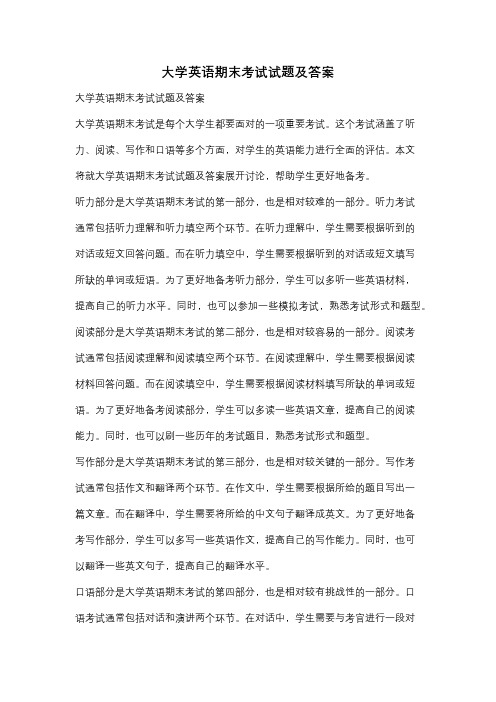
大学英语期末考试试题及答案大学英语期末考试试题及答案大学英语期末考试是每个大学生都要面对的一项重要考试。
这个考试涵盖了听力、阅读、写作和口语等多个方面,对学生的英语能力进行全面的评估。
本文将就大学英语期末考试试题及答案展开讨论,帮助学生更好地备考。
听力部分是大学英语期末考试的第一部分,也是相对较难的一部分。
听力考试通常包括听力理解和听力填空两个环节。
在听力理解中,学生需要根据听到的对话或短文回答问题。
而在听力填空中,学生需要根据听到的对话或短文填写所缺的单词或短语。
为了更好地备考听力部分,学生可以多听一些英语材料,提高自己的听力水平。
同时,也可以参加一些模拟考试,熟悉考试形式和题型。
阅读部分是大学英语期末考试的第二部分,也是相对较容易的一部分。
阅读考试通常包括阅读理解和阅读填空两个环节。
在阅读理解中,学生需要根据阅读材料回答问题。
而在阅读填空中,学生需要根据阅读材料填写所缺的单词或短语。
为了更好地备考阅读部分,学生可以多读一些英语文章,提高自己的阅读能力。
同时,也可以刷一些历年的考试题目,熟悉考试形式和题型。
写作部分是大学英语期末考试的第三部分,也是相对较关键的一部分。
写作考试通常包括作文和翻译两个环节。
在作文中,学生需要根据所给的题目写出一篇文章。
而在翻译中,学生需要将所给的中文句子翻译成英文。
为了更好地备考写作部分,学生可以多写一些英语作文,提高自己的写作能力。
同时,也可以翻译一些英文句子,提高自己的翻译水平。
口语部分是大学英语期末考试的第四部分,也是相对较有挑战性的一部分。
口语考试通常包括对话和演讲两个环节。
在对话中,学生需要与考官进行一段对话。
而在演讲中,学生需要就所给的题目进行发言。
为了更好地备考口语部分,学生可以多与他人进行英语对话,提高自己的口语表达能力。
同时,也可以多练习英语演讲,提高自己的演讲能力。
综上所述,大学英语期末考试试题及答案的备考方法是多方面的。
学生需要在听力、阅读、写作和口语等方面进行全面的准备。
大一英语期末考试题型
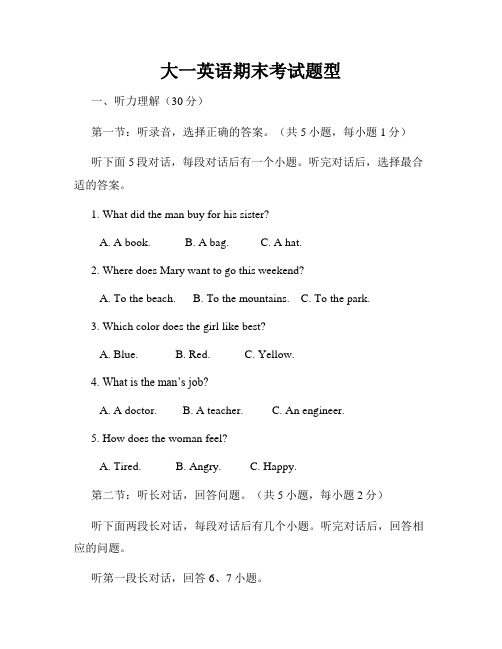
大一英语期末考试题型一、听力理解(30分)第一节:听录音,选择正确的答案。
(共5小题,每小题1分)听下面5段对话,每段对话后有一个小题。
听完对话后,选择最合适的答案。
1. What did the man buy for his sister?A. A book.B. A bag.C. A hat.2. Where does Mary want to go this weekend?A. To the beach.B. To the mountains.C. To the park.3. Which color does the girl like best?A. Blue.B. Red.C. Yellow.4. What is the man’s job?A. A doctor.B. A teacher.C. An engineer.5. How does the woman feel?A. Tired.B. Angry.C. Happy.第二节:听长对话,回答问题。
(共5小题,每小题2分)听下面两段长对话,每段对话后有几个小题。
听完对话后,回答相应的问题。
听第一段长对话,回答6、7小题。
6. What does the man’s father do?A. A doctor.B. A teacher.C. An engineer.7. How often does the man visit his family?A. Every week.B. Every month.C. Every year.听第二段长对话,回答8、9、10小题。
8. What is the woman’s favorite subject?A. Math.B. English.C. Science.9. Why does the woman have to leave early?A. She has an appointment.B. She has to catch a train.C. She is not feeling well.10. What will the man do after the class?A. Study at the library.B. Go home.C. Play basketball.第三节:听独白,回答问题。
16级《大学英语》期末考试题型及范围

2016-2017学年第一学期16级《大学英语》期末考试题型及范围I. Grammar & Vocabulary (35’)Section A(15×1’=15’)Directions: In this section, there are 10 incomplete sentences. You are required to complete each one by deciding on the most appropriate word or words from the 4 choices marked A, B, C and D. Then you should write the corresponding letter on the Answer Sheet.此部分全部为语法题,考点为本学期课本中所学的语法知识。
可以有3-4个是课本中的练习题。
重点语法点具体有(后面数字为建议出题数):(1) 现在分词和过去分词(两者间的区别, 如作状语或后置定语等)2-3(2) 不定式(常用动词与不定式搭配;remember/ forget/ regret to do 与remember/ forget/ regret doing 的区别;不定式作后置定语、状语、主语等的运用)1-2 (3) 动名词(常用动词与动名词搭配;try/mean/stop to do与try/mean/stop doing 的区别;It is no use/good+动名词,be busy+动名词, have trouble/difficulty ++动名词等常见句型的使用)1-2(4) 名词性从句(建议重点考察what与That的区别, whether与if的区别) 1-2(5) 定语从句(如何选择正确的关系词(重点),关系词只能用that的情况,介词+关系词)1-2 (6) 状语从句(hardly……when与no sooner……than的句型或其他常见引导词引导不同的状语从句)1-2 (7) 强调句(It is/was……that……) 1 (8)时态(一般时态,现在过去进行时态,现在过去完成时态)2-3 (9) 主谓一致(就远原则,就近原则,each/many a修饰名词的情况等)1-2 (10)虚拟语气(if引导的非真实条件句,表示“命令、要求”的虚拟)1-2e.g. He pretended his father and just left his house.A. not seeingB. not to seeC. to not seeD. not seenSection B(10×1’=10’)Directions: There are 10 incomplete statements here. You should fill in each blank with the proper form of the word given in brackets. Write the word or words in the corresponding space on the Answer Sheet.此部分全部出自《综合实训》中的Part One Word building 中V. 的词型转换。
大学英语III期末考试及补考题型说明
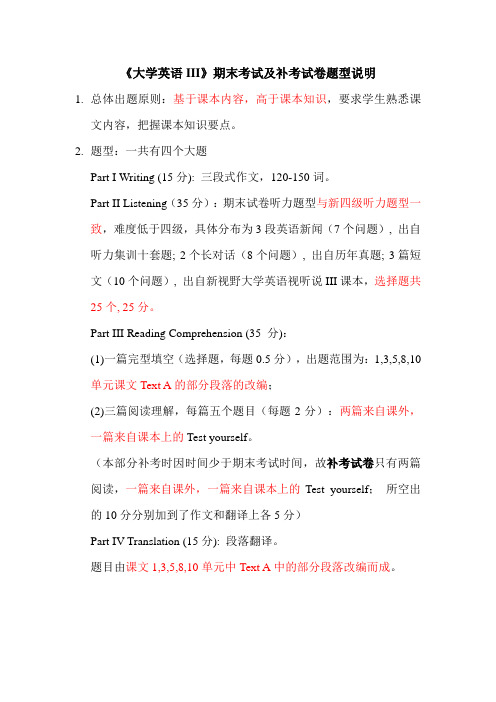
《大学英语III》期末考试及补考试卷题型说明
1.总体出题原则:基于课本内容,高于课本知识,要求学生熟悉课
文内容,把握课本知识要点。
2.题型:一共有四个大题
Part I Writing (15分): 三段式作文,120-150词。
Part II Listening(35分):期末试卷听力题型与新四级听力题型一致,难度低于四级,具体分布为3段英语新闻(7个问题), 出自听力集训十套题; 2个长对话(8个问题), 出自历年真题; 3篇短文(10个问题), 出自新视野大学英语视听说III课本,选择题共25个, 25分。
Part III Reading Comprehension (35 分):
(1)一篇完型填空(选择题,每题0.5分),出题范围为:1,3,5,8,10
单元课文Text A的部分段落的改编;
(2)三篇阅读理解,每篇五个题目(每题2分):两篇来自课外,
一篇来自课本上的Test yourself。
(本部分补考时因时间少于期末考试时间,故补考试卷只有两篇阅读,一篇来自课外,一篇来自课本上的Test yourself;所空出的10分分别加到了作文和翻译上各5分)
Part IV Translation (15分): 段落翻译。
题目由课文1,3,5,8,10单元中Text A中的部分段落改编而成。
大学英语期末考试试题及答案
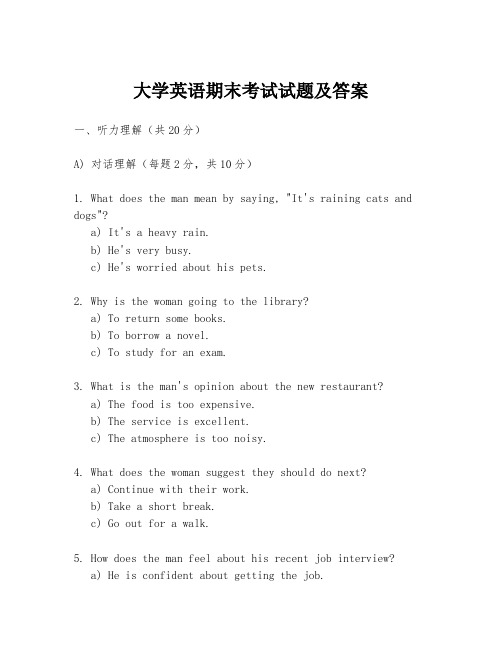
大学英语期末考试试题及答案一、听力理解(共20分)A) 对话理解(每题2分,共10分)1. What does the man mean by saying, "It's raining cats and dogs"?a) It's a heavy rain.b) He's very busy.c) He's worried about his pets.2. Why is the woman going to the library?a) To return some books.b) To borrow a novel.c) To study for an exam.3. What is the man's opinion about the new restaurant?a) The food is too expensive.b) The service is excellent.c) The atmosphere is too noisy.4. What does the woman suggest they should do next?a) Continue with their work.b) Take a short break.c) Go out for a walk.5. How does the man feel about his recent job interview?a) He is confident about getting the job.b) He is unsure about the outcome.c) He is disappointed with his performance.B) 短文理解(每题2分,共10分)Listen to the short passage and answer the following questions.6. What is the main topic of the lecture?a) The impact of social media on society.b) The benefits of regular exercise.c) The history of space exploration.7. According to the speaker, what is the most significanteffect of social media?a) It helps people stay connected.b) It can lead to feelings of isolation.c) It has transformed the way businesses operate.8. What does the speaker suggest as a solution to the problem?a) Reducing the time spent on social media.b) Encouraging more face-to-face interactions.c) Using social media more responsibly.9. What is an example given to illustrate the point?a) A study showing the negative effects of social media.b) A personal anecdote about the benefits of exercise.c) A historical account of a space mission.10. What is the conclusion of the lecture?a) Social media should be avoided.b) A balanced approach to social media is necessary.c) The future of social media is uncertain.二、阅读理解(共30分)A) 选择题(每题3分,共15分)Read the following passage and choose the best answer for each question.Passage 1: The Importance of Biodiversity11. What is the primary reason for protecting biodiversity?a) To maintain the balance of ecosystems.b) To provide resources for human use.c) To preserve habitats for endangered species.12. According to the passage, which of the following is NOT a benefit of biodiversity?a) It supports a variety of life forms.b) It contributes to the food supply.c) It helps in climate regulation.13. What is one of the major threats to biodiversity?a) Climate change.b) Urbanization.c) Overpopulation.14. What does the author suggest as a way to protect biodiversity?a) Implementing stricter laws.b) Encouraging sustainable practices.c) Increasing public awareness.15. What is the main purpose of the passage?a) To inform readers about the importance of biodiversity.b) To argue for the need for stronger environmental policies.c) To discuss the economic value of biodiversity.B) 简答题(每题3分,共15分)Read the following passage and answer the questions in your own words.Passage 2: The Role of Technology in Education16. How has technology changed the way students learn?_________________________________________________________________________17. What are some potential drawbacks of relying too much on technology in education?_________________________________________________________________________18. How can teachers use technology to enhance the learning experience?_________________________________________________________________________19. What is the author's view on the balance between traditional and technological methods in education?_____________________________________________________________ ____________20. What conclusion does the author draw about the future of education technology?_____________________________________________________________ ____________三、词汇与语法(共20分)A) 词汇题(每题2分,共10分)21. The opposite of "humble" is:a) Arrogantb) Modestc) Generous22. The word that best completes the sentence "She was so______ by the news that she couldn't sleep." is:a) Amusedb) Disappointedc) Distraught23. Which of the following is a synonym for "catalyst"?a) Obstacleb) Incentivec) Hindrance。
大学英语考试题型
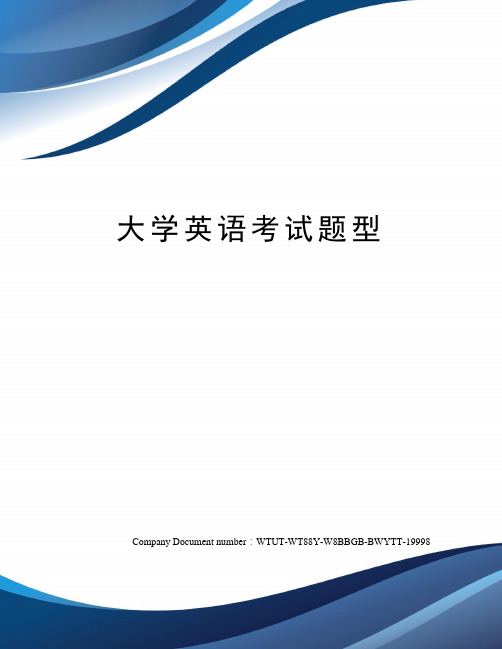
大学英语考试题型Company Document number:WTUT-WT88Y-W8BBGB-BWYTT-19998外国语学院《大学英语》考试题型大学英语一级期中考试题型:(手改18分)1. 快速阅读(1-10题/每题1分,共10分) 7个客观题 3个填空题(课外)●A、B、C、怀德试卷,该部分相同2. 听力(11-35题/每题1分,共25分)(课外)第一部分:共15个客观题8个短对话,每个对话1题;2个长对话,共7题第二部分:共10个客观题,3段短文●A、B、C、怀德试卷,该部分相同3. 阅读理解(36-55题,共30分) 20个客观题第一部分(36-45题):15选10,每题1分,共10分(从考试范围内的课文内容中出题)第二部分(46-55题)):2篇阅读理解,每篇5个客观题,每题2分,共20分(课外)●第一部分,A、B、C、怀德试卷,根据考试范围出题;考试范围一致的情况下,该部分怀德试卷可以与C班试卷相同。
●第二部分,A、B、C、怀德试卷,可以有一篇难度适中的阅读理解相同,另外一篇根据试卷的难度级别,选择合适的文章。
4. 词汇(56-75题/每题1分,共20分) 20个客观题主要出题范围:1) Test Yourself2)《大学英语同步辅导教程》相应练习3) 课后习题改编4) 四级真题●A、B、C、怀德试卷,根据各级具体的考试范围出题。
考试范围相同的情况下,从课本上出的题目可以相同,课外题目根据试卷难度级别,选择不同的题目;考试范围不同的情况下,按照各级试卷的考试范围和难易程度出题。
5. 完形填空(76-95题/每题分,共10分)20个客观题(课外)●A、B、C、怀德试卷,根据试卷的难度级别出题。
6. 翻译(96-100题/每题1分,共5分)(从课本的课后练习中出题)●A、B、C、怀德试卷,根据具体的考试范围出题。
大学英语一级期末考试题型:(手改18分)1. 快速阅读(1-10题/每题1分,共10分) 7个客观题 3个填空题(课外)●A、B、C、怀德试卷,该部分相同2. 听力(11-35题/每题1分,共25分)(课外)第一部分:共15个客观题8个短对话,每个对话1题;2个长对话,共7题第二部分:共10个客观题,3段短文●A、B、C、怀德试卷,该部分相同3. 阅读理解(36-45题,共20分) 10个客观题(课外)2篇阅读理解,每篇5个客观题,每题2分,共20分●A、B、C、怀德试卷,可以有一篇难度适中的阅读理解相同,另外一篇根据试卷的难度级别,选择合适的文章。
大学英语期末试题分析总结
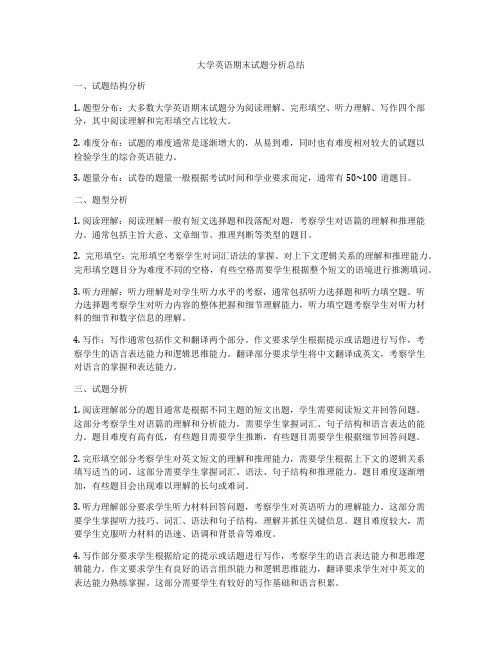
大学英语期末试题分析总结一、试题结构分析1. 题型分布:大多数大学英语期末试题分为阅读理解、完形填空、听力理解、写作四个部分,其中阅读理解和完形填空占比较大。
2. 难度分布:试题的难度通常是逐渐增大的,从易到难,同时也有难度相对较大的试题以检验学生的综合英语能力。
3. 题量分布:试卷的题量一般根据考试时间和学业要求而定,通常有50~100道题目。
二、题型分析1. 阅读理解:阅读理解一般有短文选择题和段落配对题,考察学生对语篇的理解和推理能力。
通常包括主旨大意、文章细节、推理判断等类型的题目。
2. 完形填空:完形填空考察学生对词汇语法的掌握、对上下文逻辑关系的理解和推理能力。
完形填空题目分为难度不同的空格,有些空格需要学生根据整个短文的语境进行推测填词。
3. 听力理解:听力理解是对学生听力水平的考察,通常包括听力选择题和听力填空题。
听力选择题考察学生对听力内容的整体把握和细节理解能力,听力填空题考察学生对听力材料的细节和数字信息的理解。
4. 写作:写作通常包括作文和翻译两个部分。
作文要求学生根据提示或话题进行写作,考察学生的语言表达能力和逻辑思维能力。
翻译部分要求学生将中文翻译成英文,考察学生对语言的掌握和表达能力。
三、试题分析1. 阅读理解部分的题目通常是根据不同主题的短文出题,学生需要阅读短文并回答问题。
这部分考察学生对语篇的理解和分析能力,需要学生掌握词汇、句子结构和语言表达的能力。
题目难度有高有低,有些题目需要学生推断,有些题目需要学生根据细节回答问题。
2. 完形填空部分考察学生对英文短文的理解和推理能力,需要学生根据上下文的逻辑关系填写适当的词。
这部分需要学生掌握词汇、语法、句子结构和推理能力。
题目难度逐渐增加,有些题目会出现难以理解的长句或难词。
3. 听力理解部分要求学生听力材料回答问题,考察学生对英语听力的理解能力。
这部分需要学生掌握听力技巧、词汇、语法和句子结构,理解并抓住关键信息。
10级大学英语二B班期末考试题型及复习范围(对学生)
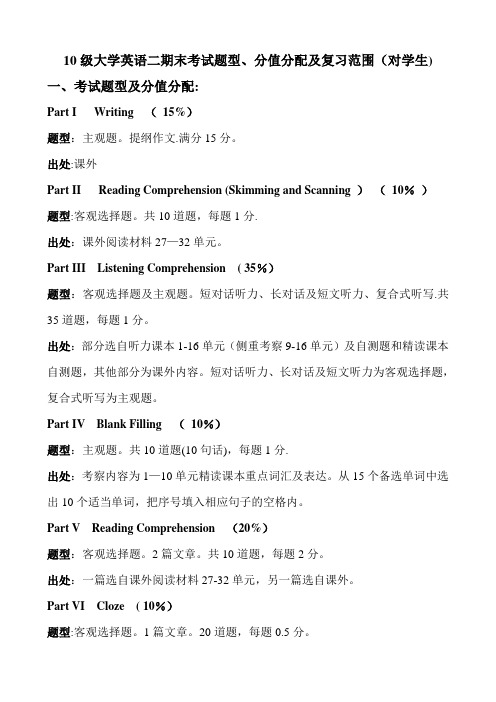
10级大学英语二期末考试题型、分值分配及复习范围(对学生) 一、考试题型及分值分配:
Part I Writing (15%)
题型:主观题。
提纲作文.满分15分。
出处:课外
Part II Reading Comprehension (Skimming and Scanning )(10%)
题型:客观选择题。
共10道题,每题1分.
出处:课外阅读材料27—32单元。
Part III Listening Comprehension ( 35%)
题型:客观选择题及主观题。
短对话听力、长对话及短文听力、复合式听写.共35道题,每题1分。
出处:部分选自听力课本1-16单元(侧重考察9-16单元)及自测题和精读课本自测题,其他部分为课外内容。
短对话听力、长对话及短文听力为客观选择题,复合式听写为主观题。
Part IV Blank Filling (10%)
题型:主观题。
共10道题(10句话),每题1分.
出处:考察内容为1—10单元精读课本重点词汇及表达。
从15个备选单词中选出10个适当单词,把序号填入相应句子的空格内。
Part V Reading Comprehension (20%)
题型:客观选择题。
2篇文章。
共10道题,每题2分。
出处:一篇选自课外阅读材料27-32单元,另一篇选自课外。
Part VI Cloze ( 10%)
题型:客观选择题。
1篇文章。
20道题,每题0.5分。
出处:根据1—10单元课文内容或课后练习改编。
大学英语期末考试题型及复习范围(优秀范文5篇)
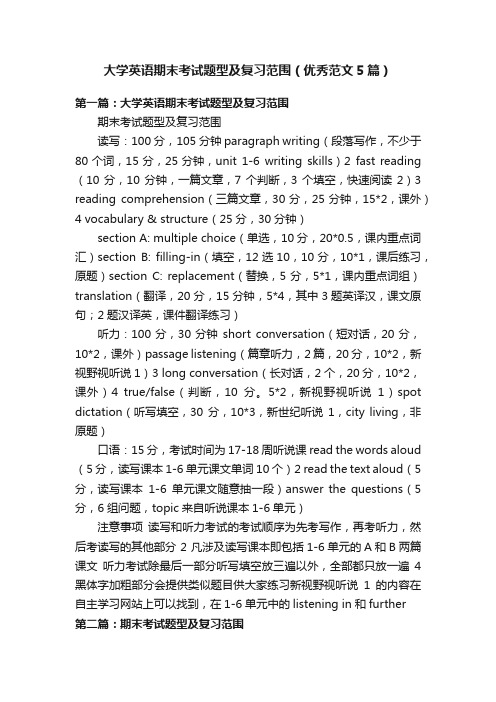
大学英语期末考试题型及复习范围(优秀范文5篇)第一篇:大学英语期末考试题型及复习范围期末考试题型及复习范围读写:100分,105分钟 paragraph writing(段落写作,不少于80个词,15分,25分钟,unit 1-6 writing skills)2 fast reading (10分,10分钟,一篇文章,7个判断,3个填空,快速阅读2)3 reading comprehension(三篇文章,30分,25分钟,15*2,课外)4 vocabulary & structure(25分,30分钟)section A: multiple choice(单选,10分,20*0.5,课内重点词汇)section B: filling-in(填空,12选10,10分,10*1,课后练习,原题)section C: replacement(替换,5分,5*1,课内重点词组)translation(翻译,20分,15分钟,5*4,其中3题英译汉,课文原句;2题汉译英,课件翻译练习)听力:100分,30分钟short conversation(短对话,20分,10*2,课外)passage listening(篇章听力,2篇,20分,10*2,新视野视听说1)3 long conversation(长对话,2个,20分,10*2,课外)4 true/false(判断,10分。
5*2,新视野视听说1)spot dictation(听写填空,30分,10*3,新世纪听说1,city living,非原题)口语:15分,考试时间为17-18周听说课 read the words aloud (5分,读写课本1-6单元课文单词10个)2 read the text aloud(5分,读写课本1-6单元课文随意抽一段)answer the questions(5分,6组问题,topic来自听说课本1-6单元)注意事项读写和听力考试的考试顺序为先考写作,再考听力,然后考读写的其他部分 2 凡涉及读写课本即包括1-6单元的A和B两篇课文听力考试除最后一部分听写填空放三遍以外,全部都只放一遍4 黑体字加粗部分会提供类似题目供大家练习新视野视听说1的内容在自主学习网站上可以找到,在1-6单元中的listening in和further第二篇:期末考试题型及复习范围期末考试题型及复习范围题型:Part onevocabulary and Structure50题,每题1分Part twoReading Comprehension2篇文章,10题,每题1分Part threeCloze1篇文章,10题,每题1分Part fourTranslation1篇英译汉,10分5个汉译英句子,每个句子4分复习范围:第一部分词汇与结构P127,P270 词汇与结构题第二部分阅读理解P121-124P266-269第三部分完型填空P58P273(只有10个空填词)第四部分翻译英译汉第一、三单元,每单元前三段。
期末英语考试题型及复习范围
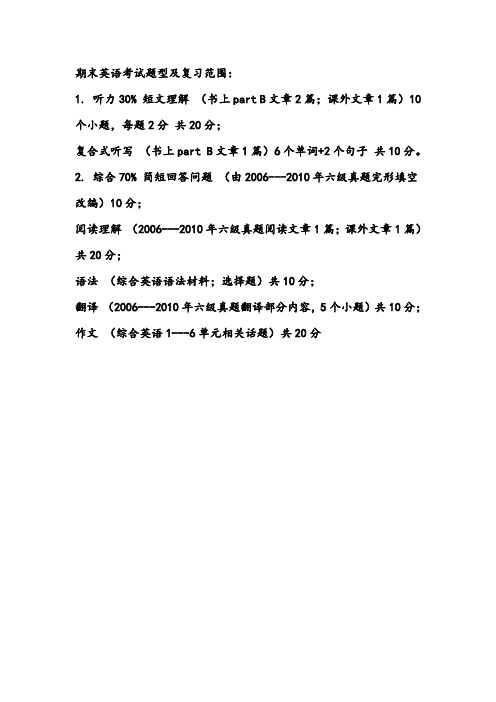
期末英语考试题型及复习范围:1. 听力30% 短文理解(书上part B文章2篇;课外文章1篇)10个小题,每题2分共20分;复合式听写(书上part B文章1篇)6个单词+2个句子共10分。
2. 综合70% 简短回答问题(由2006---2010年六级真题完形填空改编)10分;阅读理解(2006---2010年六级真题阅读文章1篇;课外文章1篇)共20分;语法(综合英语语法材料;选择题)共10分;翻译(2006---2010年六级真题翻译部分内容,5个小题)共10分;作文(综合英语1---6单元相关话题)共20分综英书1-6单元语法, 期末出选择题Unit 11. not until 置于句首,主句要用部分倒装(1) 原句:Not until January 1943 did the Germans give up their siege.(Line 99-100)(2) 用法:否定型倒装,指的是将含有否定意义的副词置于句首时,其后句子要用部分倒装。
具体说来,这类倒装又有以下几个小类:a. 将否定副词never, seldom, rarely, little, hardly, scarcely, nowhere 等置于句首时,其后引出部分倒装。
如:Hardly had the performance begun when the lights went out. 演出刚开始就停电了。
b. 将no sooner…than…结构中的no sooner置于句首时,其后引出部分倒装。
如:No sooner had we left the house than it began to rain. 我们刚离开家就开始下雨了。
c. 将not…until…结构中的not…结构置于句首时,其后引出部分倒装。
如:Not until we lose our health do we realize its value. 等到失去了健康,才明白它的价值。
大学_大学英语期末考考试题及答案评分标准
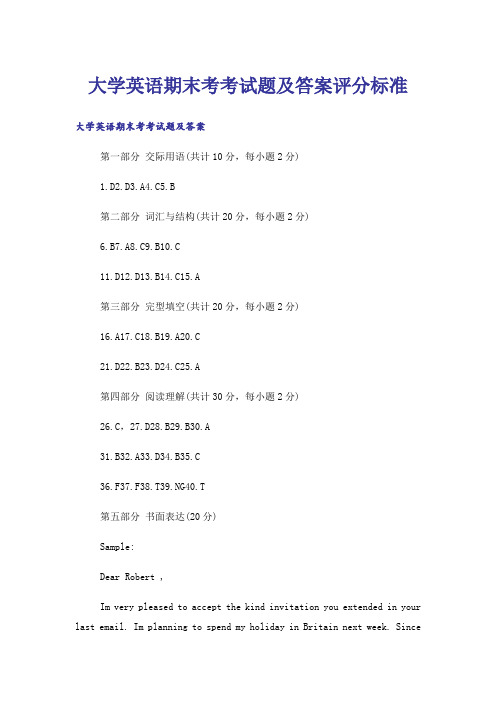
大学英语期末考考试题及答案评分标准大学英语期末考考试题及答案第一部分交际用语(共计10分,每小题2分)1.D2.D3.A4.C5.B第二部分词汇与结构(共计20分,每小题2分)6.B7.A8.C9.B10.C11.D12.D13.B14.C15.A第三部分完型填空(共计20分,每小题2分)16.A17.C18.B19.A20.C21.D22.B23.D24.C25.A第四部分阅读理解(共计30分,每小题2分)26.C,27.D28.B29.B30.A31.B32.A33.D34.B35.C36.F37.F38.T39.NG40.T第五部分书面表达(20分)Sample:Dear Robert ,Im very pleased to accept the kind invitation you extended in your last email. Im planning to spend my holiday in Britain next week. Sincethis is my first visit to your country, I hope you will be able to meet me at the airport. My flight details -- the plane leaves Beijing at 1230 next Thursday and arrives in London at 14 30 (local time). The flight number is CA1347. Thank you and looking forward to meeting you in London. With best wishes.Zhang Lin大学英语考试题答案及评分标准一、阅读下面的小对话,从A、B、C、D四个选项中选出一个能填入空白处的最佳选项,并在答题纸上写出所选的字母符号。
大学英语考试题型
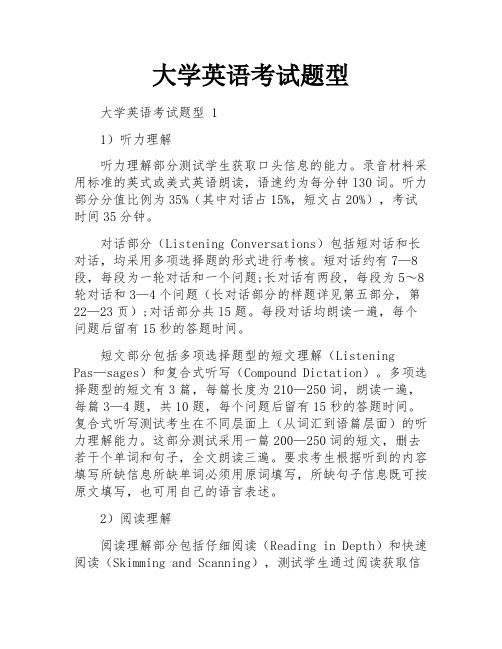
大学英语考试题型大学英语考试题型 11)听力理解听力理解部分测试学生获取口头信息的能力。
录音材料采用标准的英式或美式英语朗读,语速约为每分钟l30词。
听力部分分值比例为35%(其中对话占15%,短文占20%),考试时间35分钟。
对话部分(Listening Conversations)包括短对话和长对话,均采用多项选择题的形式进行考核。
短对话约有7—8段,每段为一轮对话和一个问题;长对话有两段,每段为5~8轮对话和3—4个问题(长对话部分的样题详见第五部分,第22—23页);对话部分共l5题。
每段对话均朗读一遍,每个问题后留有15秒的答题时间。
短文部分包括多项选择题型的短文理解(Listening Pas—sages)和复合式听写(Compound Dictation)。
多项选择题型的短文有3篇,每篇长度为210—250词,朗读一遍,每篇3—4题,共10题,每个问题后留有15秒的答题时间。
复合式听写测试考生在不同层面上(从词汇到语篇层面)的听力理解能力。
这部分测试采用一篇200—250词的短文,删去若干个单词和句子,全文朗读三遍。
要求考生根据听到的内容填写所缺信息所缺单词必须用原词填写,所缺句子信息既可按原文填写,也可用自己的语言表述。
2)阅读理解阅读理解部分包括仔细阅读(Reading in Depth)和快速阅读(Skimming and Scanning),测试学生通过阅读获取信息的能力;所占分值比例为35%(其中仔细阅读部分25%,快速阅读部分l0%。
)考试时间40分钟。
仔细阅读部分要求考生阅读三篇短文。
两篇为多项选择题型的短文理解测试,每篇长度为300—350词。
一篇为选词填空(Banked Cloze)或简答题(Short Answer Questions)。
选词填空篇章长度为200—250词,简答题篇章长度为300—350词。
阅读部分测试考生在不同层面上的阅读理解能力,包括理解主旨大意和细节、综合分析以及根据上下文推测词义等。
大学英语(1)期末复习范围及重点
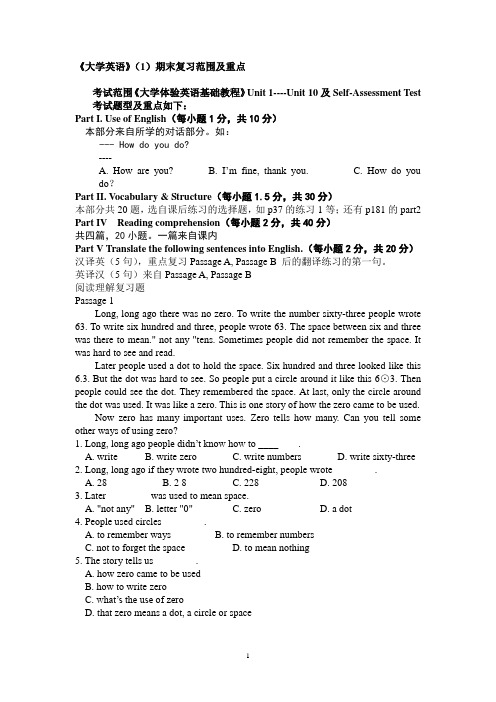
《大学英语》(1)期末复习范围及重点考试范围《大学体验英语基础教程》Unit 1----Unit 10及Self-Assessment Test 考试题型及重点如下:Part I. Use of English(每小题1分,共10分)本部分来自所学的对话部分。
如:--- How do you do?----_____________A. How are you?B. I’m fine, thank you.C. How do youdo?Part II. Vocabulary & Structure(每小题1.5分,共30分)本部分共20题,选自课后练习的选择题,如p37的练习1等;还有p181的part2 Part IV Reading comprehension(每小题2分,共40分)共四篇,20小题。
一篇来自课内Part V Translate the following sentences into English.(每小题2分,共20分)汉译英(5句),重点复习Passage A, Passage B 后的翻译练习的第一句。
英译汉(5句)来自Passage A, Passage B阅读理解复习题Passage 1Long, long ago there was no zero. To write the number sixty-three people wrote 63. To write six hundred and three, people wrote 63. The space between six and three was there to mean." not any "tens. Sometimes people did not remember the space. It was hard to see and read.Later people used a dot to hold the space. Six hundred and three looked like this 6.3. But the dot was hard to see. So people put a circle around it like this 6⊙3. Then people could see the dot. They remembered the space. At last, only the circle around the dot was used. It was like a zero. This is one story of how the zero came to be used.Now zero has many important uses. Zero tells how many. Can you tell some other ways of using zero?1. Long, l ong ago people didn’t know how to ________.A. writeB. write zeroC. write numbersD. write sixty-three2. Long, long ago if they wrote two hundred-eight, people wrote ________.A. 28B. 2 8C. 228D. 2083. Later ________ was used to mean space.A. "not any"B. letter "0"C. zeroD. a dot4. People used circles ________.A. to remember waysB. to remember numbersC. not to forget the spaceD. to mean nothing5. The story tells us ________.A. how zero came to be usedB. how to write zeroC. what’s the use of zeroD. that zero means a dot, a circle or spacePassage 2If you do not use your arms or your legs for some time, they will become weak, and when you start using them again, they slowly become strong again. Everybody knows that. Y et many people do not seem to know that memory works in the same way.When someone says that he has a good memory, he really means that he keeps his memory in practice by using it. When someone else says that his memory is poor, he really means that he does not give it enough chance to become strong.If a friend says that his arms and legs are weak, we know that it is his own fault. But if he tells us that he has a poor memory, many of us think that his parents may be blamed, and few of us know that it is just his own fault. Have you ever found that some people can't read or write but usually they have better memories? This is because they cannot read or write and when they have to remember things, they cannot write them down in a small notebook. As a result, they have to remember days, names, songs and stories, so their memory is being exercised the whole time.So if you want to have a good memory, learn from the people: practice remembering things in a way as other people do.1. Someone can't have a good memory if ________.A. he can't read or writeB. his parents haven't a good memoryC. he doesn't make good use of his memoryD. he doesn't use his arms or legs for some time2. If you do not use your arms or legs for some time, ________.A. they will become thinB. they will become weakC. they begin to ache all overD. you can't use them any more3. Which of the following statements is true?A. Y our memory needs chance for practice.B. A good memory is inherited from parents.C. Y our memory works in the different ways as your arms or legs.D. Don't learn to read and write if you want to have a good memory.4. Few people know that if someone has a poor memory it is ________.A. his own faultB. his parents' faultC. his teachers' faultD. his friends' fault5. The writer wants to tell us ________.A. how to read and write wellB. how to have a good memoryC. how to use our arms or legs betterD. how to learn from the people who can't read or writePassage 3A foreigner's first impression of the U.S. is likely to be that everyone is in a rush-often under pressure. City people always appear to be hurrying to get where they are going restlessly, seeking attention in a store, and elbowing others as they try to complete their errands(任务). Racing through daytime meals is part of the pace of life in this country.Working time is considered precious. Others in public eating places are waiting for you to finish so that they too can be served and get back to work within the time allowed. Each person hurries to make room for the next person. If you don’t, waiters will hurry you.Y ou also find drivers will be abrupt and people will push past you. Y ou will miss smiles, brief conversations, and small courtesies with strangers. Don't take it personally. This is because people value time highly, and they resent someone else "wasting" it beyond a certain courtesy point.The view of time affects the importance we attach to patience. In the American system of values, patience is not a high priority. Many of us have what might be called “a short fuse.” We begin to move restlessly about if we feel time is slipping away without some re-turnbe this in terms of pleasure, work value, or rest. Those coming from lands where time is looked upon differently may find this matter of pace to be one of their most difficult adjustments in both business and daily life.Many newcomers to the States will miss the opening courtesy of a business call, for example, They will miss the ritual interaction that goes with a welcoming cup of tea or coffee that may be a convention in their own country. They may miss leisurely business chats in a caféor coffee house. Normally, Americans do not assess their visitors in such relaxed surroundings over prolonged small talks. We seek out evidence of past performance rather than evaluate a business colleague through social courtesies. Since we generally assess and probe professionally rather than socially, we start talking business very quickly.1. Which of the following statements is wrong?A. Americans seem to be always under pressure.B. Americans attach less importance to patience.C. Americans don’t care much about ritual socializing.D. Americans are impolite to their business colleagues.2. In the fourth paragraph, “a high priority” means ________?A. a less important thingB. a first concernC. a good businessD. an attractive gift3. Americans evaluate a business colleague ________.A. through social courtesyB. through prolonged business talksC. by establishing business relationsD. by learning about their past performance4. This passage mainly talks about ________.A. how Americans treasure their timeB. how busy Americans are every dayC. how Americans do business with foreignersD. what American way of life is like5. We can infer from the passage that the author’s tone in writing is ________.A. criticalB. ironicalC. appreciativeD. objectivePassage 4In the United States, it is not customary to telephone someone very early in the morning. If you telephone him early in the day, while he is shaving or having breakfast, the time of the call shows that the matter is very important and requires immediate attention. The same meaning is attached to telephone calls made after 11:00 p.m. If someone receives a call during sleeping hours, he assumes it’s a matter of life or death. The time chosen for the call communicates its importance. In social life, time plays a very important part. In the U.S.A. guests tend to feel they are not highly regarded if the invitation to a dinner party is extended only three or four days before the party date. But it is not true in all countries. In other areas of the world, it may be considered foolish to make an appointment too far in advance because plans which are made for a date more than a week away tend to be forgotten. The meaning of time differs in different parts of the world. Thus, misunderstandings arise between people from different cultures that treat time differently. Promptness is valued highly in American life, for example. If people are not prompt, they may be regarded as impolite or not fully responsible. In the U.S. no one would think of keeping a business associate waiting for an hour, it would be too impolite. A person who is 5 minutes late, will say a few words of explanation, though perhaps he will not complete the sentence. (260 words)1. What is the main idea of this passage?A. It is not customary to telephone someone in the morning and in sleeping hours in the U.S.B. The role of time in social life over the world.C. If people are not prompt, they may be regarded as impolite or not fully responsible in the U.S.D. Not every country treats the concept of time as the same.2. What does it mean in the passage if you call someone during his or her sleeping hours?A. A matter of work.B. A matter of life or death.C. Y ou want to see him or her.D. Y ou want to make an appointment with him or her.3. Which of the following time is proper if you want to make an appointment with your friend?A. at 7: 00 am.B. at 4:00 pm.C. at the midnight.D. at 4:00 am.4. Which of the following statements is true according to the passage?A. In the U.S.A guests tend to feel they are highly regarded if the invitation to a dinner party is extended only three or four days before the party date.B. There is no misunderstanding arising between people from different cultures about the concept of time.C. It may be considered foolish to make an appointment well in advance in the U.S.A..D. Promptness is valued highly in American life.5. From the passage we can safely infer that _________.A. it’s a matter of life or death if you call someone in day timeB. the meaning of time differs in different parts of the worldC. it makes no difference in the U.S. whether you are early or late for a business partyD. if a person is late for a date, he needn’t make some explanationPassage 5People used to say, "The hand that rocks (摇) the cradle (摇篮) rules the world, "and "Behind every successful man, there’s a woman. "Both these sayings mean the same thing: Men rule the world, but their wives rule them.Most of the American women like making their husbands and sons successful, but some of them want something for themselves. They want good jobs. When they work, they want to be better paid, they want to be as successful as men.The American women’s liberation movement was started by the women who don’t want to stand behind successful men. They don’t want to be told that certain jobs of offices are closed to them. They refuse to work side by side with men who do the same work for a higher pay.A liberated woman must be proud of being a woman and confidence (信心) herself. If somebody says to her, "Y ou’ve come a long way, baby. "She’ll smile and answer. "Not nearly as far as I’m going to go , baby."This movement is quite new, and many American women do not agree. But it has already made some important changes in women’s lives-in men’s lives, too.1. "The hand that rocks the cradle rules the world." means ________.A. woman can not only give birth to children but rule a countryB. women not only raise their children but support their husbandsC. women do play an important part in men’s lives and workD. a man can’t be successful without being married2. "Y ou’ve come a long way, baby." means _________.A. "you have walked far from your home"B. "she was done a lot and succeeded greatly in freeing herself"C. "she has worked outside far from her home"D. "you really love me, dear"3. "Not nearly as far as I’m going to go, baby." means ________.A. "the way isn’t very far"B. "she must go even farther to work"C. "she isn’t so satisfied with success"D. "she is very much satisfied with her the way she covered"4. According to the passage, the writer ________ the women’s liberation.A. is all forB. doesn’t tell us his idea onC. is strongly againstD. isn’t strongly against5. The best title of this passage should be ________.A. Something about WomenB. Women and Their HusbandsC. Men’s Liberation in the USAD. Women’s Liberation in the USAPassage 6Sixteen-year-old Maria was waiting in line at the airport in Santo Domingo. She was leaving her native country to join her sister in the United States. She spoke English very well. Though she was very happy she could go abroad, she was feeling sad at leaving her family and friends. As she was thinking all about this, she suddenly heard the airline employee asking her to pick up her luggage and put it on the scales (称). Maria pulled and pulled. The bag was too heavy and she just couldn’t lift it up. The man behind her got very impatient. He, too, was waiting to check in his luggage.“What’s wrong with this girl?” He said, “Why doesn’t she hurry up?” He moved forward and placed his bag on the counter, hoping to check in first. He was in a hurry to get a good seat.Maria was very angry, but she was very polite. And in her best English she said, “Why are you so upset? There are enough seats for everyone on the plane. If you are in such a hurry, why can’t you give me a hand with my luggage?”The man was surprised to hear Maria speak English. He quickly picked up her luggage and stepped back. Everyone was looking at him with disapproval.1. Maria’s story happened ________.A. when she was leaving AmericaB. on her way back to Santo DomingoC. before she left the USAD. when she arrived at the airport2. Y ou believer that the work of the airline employee mentioned in the story is to _______ at the airport.A. help carry people’s luggageB. ask people to pick up the luggageC. check people’s luggageD. take care of people’s luggage3. “Why are you so upset?” Maria said to the man. She wanted to tell him that he should not be _______.A. surprisedB. sadC. unhappyD. sorry4. “Everyone was looking at him with disapproval.” This sentence means that the people around felt _______.A. worried about MariaB. worried about the manC. sorry for Maria’s mannersD. sorry for the man’s manners5. The author mentioned Maria’s age at the beginning of th e story in order to show that _________.A. she was young but behaved properlyB. she would not have left home aloneC. everyone around her was wrongD. it was not good that nobody offered to help herPassage 7There are three kinds of goals: short-term, medium-range and long-term goals.Short-term goals are those that usually deal with current activities, which we can apply on a daily basis. Such goals can be achieved in a week or less, or two weeks, or possibly, months. It should be remembered that just as a building is no stronger than its foundation, long-term goals cannot amount to very much without the achievementof solid short-term goals. Upon completing our short-term goals, we should date the occasion and then add new short-term goals that will build on those that have been completed.The intermediate goals build on the foundation of the short-term goals. They might deal with just one term of school or the entire school year, or they could even extend for several years. Any time you move a step at a time, you should never allow yourself to become discouraged or overwhelmed. As you complete each step, you will enforce the belief in your ability to grow and succeed. And as your list of completion dates grow, your motivation and desire will increase.Long-term goals may be related to our dreams of the future. They might cover five years or more. Life is not a static thing. We should never allow a long-term goal to limit us or our course of action.1. Our long-term goals mean a lot _________.A. If we cannot reach solid short-term goalsB. If we complete the short-term goalsC. If we have dreams of the futureD. If we put forward some plans2. New short-term goals are built upon ________.A. a daily basisB. your achievement in a weekC. current activitiesD. the goals that have been completed3. When we complete each step of our goals, ________.A. we will win final successB. we are overwhelmedC. we should build up confidence of successD. we should have strong desire for setting new goals4. What is the main idea of this passage?A Life is a dynamic thing. B. we should set up long-term goalsC. Different kinds of goals in life.D. The limitation of long-term goals.5. Which of the following statements is wrong according to the passage?A. The long-term goals cannot amount to very much without the achievement of solid short-term goalsB. The intermediate goals build on the foundation of the short-term goals.C. Life is a static thing, thus we should never allow a long-term goal to limit us or our course of action.D. We should often add new short-term goals to those which have been completed. Passage 8Britain and France are separated by the English Channel, a body of water that can be crossed in as few as 20 minutes. But the cultures of the two countries sometimes seem to be miles apart.Last Thursday Britain and France celebrated the 100th anniversary(周年纪念)of the signing of a friendship agreement called the Entente Cordiality. The agreement marked a new beginning for the countries following centuries of wars and love-hate partnership.But their relationship has been ups and downs over the past century. Just last year, there were fierce disagreements over the Iraq war-which British Prime Minister Tony Blair supported despite French President Jacques Chirac speaking out against it. This discomfort is expressed in Blair and Chirac’s body language at international meetings. While the French leader often greets German Chancellor Gerhard Schroeder with a hug(拥抱), Blair just receives a handshake. However, some political experts say the war in Iraq could in fact have helped ties.The history of divisions may well be because of the very different ways in which the two sides see the world. But this doesn’t stop 12 million Br itons taking holidays in France each year. However, only 3 million French come in the opposite direction. Surveys(调查)show that most French people feel closer to the Germans than they do to the British. And the research carried out in Britain has found that only a third of the population believes the French can be trusted. Perhaps this bad feeling comes because the British dislike France’s close relationship with Germany, or because the French are not happy with Britain’s close links with the US.Whatever th e answer is, as both sides celebrate 100 years of “doubtful friendship”, they are at least able to make jokes about each other. Here’s one: What’s the best thing about Britain’s relationship with France? The English Channel.1. For centuries, the relationship between Britain and France is ________.A. friendlyB. impoliteC. brotherlyD. a mixture of love and hate2. The war in Iraq does ________ to the relationship between France and Britain.A. goodB. harmC. neither good nor harmD. both good and harm3. The British are not so friendly to ________ and the French are not so friendly to ________.A. Germany; AmericaB. America; GermanyC. Germany; GermanyD. America; America4. ________ are more interested in having holidays in _______.A. American people…BritainB. British people … GermanyC. French people … BritainD. British people … France5. What does the last sentence mean?A. As long as the English Channel exists, no further disagreement will form between France and Britain.B. The English Channel can prevent anything unfriendly happening in both France and Britain.C. France and Britain are near neighbors, and this will help balance the relationship between them.D. The English Channel is the largest enemy between France and Britain.Passage 9When the weather is hot, you go to a lake or an ocean and may feel cool. Why? The sun makes the earth hot, but it cannot make the water very hot. Although the air over the earth becomes hot, the air over the water stays cool. The hot air over the earth rises. Then the cool air over the water moves in and takes the place of the hot air.When you are near a lake or an ocean, you feel the cool air when it moves in. Y ou feel the wind, which makes you cool.Of course, scientists cannot answer all of our questions. If we ask, "Why is the ocean full of salt?" scientists will say that the salt comes from rocks. When a rock gets very hot or very cold, it cracks. Rain falls into the cracks. The rain then carries the salt into the earth and into the rivers. The rivers carry the salt into the ocean. But then we ask, "What happens to the salt in the ocean? The ocean does not get more salty every year." Scientists are not sure about the answer to this question. We know a lot about our world. But there are still many answers that we do not have and we are curious.1. The main idea of the passage is ________.A. people feel cool when they are near a lake or an oceanB. scientists can explain everything we want to knowC. scientists can explain many things but not everythingD. the salt in the ocean comes from rocks2. Y ou feel cool when you are near a lake or an ocean because ________.A. the water is coldB. the earth is hotC. the water is colder than the earthD. the cool air from the water moves towards the land3. Now scientists know ________.A. what makes people feel cool near a lake or an ocean in summerB. everything about the oceanC. why the ocean does not get more and more saltyD. what happens to the salt in the ocean4. A rock cracks when ________.A. rain fallsB. it gets very hot or very coldC. it gets very dryD. it gets very salty5. People are always curious because ________.A. they know nothing about the worldB. they know little about the worldC. there are answers they do not haveD. all of the abovePassage 10Community service is an important component of education here at our university. We encourage all students to volunteer for at least one community activity before they graduate. A new community program called “One On One” helps elementary students who’ve fallen behind. Y our education majors mi ght be especially interested in it because it offers the opportunity to do some teaching, that is, tutoring in math and English.Y ou’d have to volunteer two hours a week for one semester. Y ou can choose to help a child with math, English, or both. Half-hour lessons are fine, so you could do a half hour of each subject two days a week.Professor Dodge will act as a mentor to the tutors —he’ll be available to help you with lesson plans or to offer suggestions for activities. He has office hours every Tuesday and Thursday afternoon. Y ou can sign up for the program with him and begin the tutoring next week.I’m sure you’ll enjoy this community service … and you’ll gain valuable experience at the same time. It looks good on your resume, too, showing that you’ve had experience with children and that you care about your community. If you’d like to sign up, or if you have any questions, stop by Professor Dodge’s office this week.1. What is the purpose of the talk?A. To explain a new requirement for graduation.B. To interest students in a new community program.C. To discuss the problems of elementary school students.D. To recruit elementary school teachers for a special program.2. What is the purpose of the program that the speaker describes?A. To find jobs for graduating students.B. To help education majors prepare for final exams.C. To offer tutorials to elementary school students.D. To provide funding for a community service project.3. What does Professor Dodge do?A. He advises students to participate in certain program.B. He teaches part-time in an elementary school.C. He observes elementary school students in the classroom.D. He helps students prepare their resumes.4. What should students who are interested in the tutorials do?A. Contact the elementary school.B. Sign up for a special class.C. Submit a resume to the dean.D. Talk to Professor Dodge.5. Whom do you think the speaker addresses?A. Faculty.B. Students.C. ResidentsD. Graduated students.。
大学英语期末考试范围说明
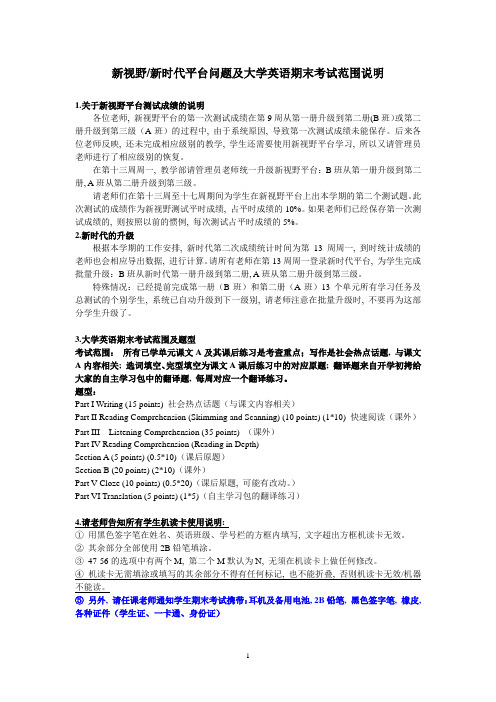
新视野/新时代平台问题及大学英语期末考试范围说明1.关于新视野平台测试成绩的说明各位老师, 新视野平台的第一次测试成绩在第9周从第一册升级到第二册(B班)或第二册升级到第三级(A班)的过程中, 由于系统原因, 导致第一次测试成绩未能保存。
后来各位老师反映, 还未完成相应级别的教学, 学生还需要使用新视野平台学习, 所以又请管理员老师进行了相应级别的恢复。
在第十三周周一, 教学部请管理员老师统一升级新视野平台:B班从第一册升级到第二册, A班从第二册升级到第三级。
请老师们在第十三周至十七周期间为学生在新视野平台上出本学期的第二个测试题。
此次测试的成绩作为新视野测试平时成绩, 占平时成绩的10%。
如果老师们已经保存第一次测试成绩的, 则按照以前的惯例, 每次测试占平时成绩的5%。
2.新时代的升级根据本学期的工作安排, 新时代第二次成绩统计时间为第13周周一, 到时统计成绩的老师也会相应导出数据, 进行计算。
请所有老师在第13周周一登录新时代平台, 为学生完成批量升级:B班从新时代第一册升级到第二册, A班从第二册升级到第三级。
特殊情况:已经提前完成第一册(B班)和第二册(A班)13个单元所有学习任务及总测试的个别学生, 系统已自动升级到下一级别, 请老师注意在批量升级时, 不要再为这部分学生升级了。
3.大学英语期末考试范围及题型考试范围:所有已学单元课文A及其课后练习是考查重点;写作是社会热点话题, 与课文A内容相关; 选词填空、完型填空为课文A课后练习中的对应原题; 翻译题来自开学初拷给大家的自主学习包中的翻译题, 每周对应一个翻译练习。
题型:Part I Writing (15 points) 社会热点话题(与课文内容相关)Part II Reading Comprehension (Skimming and Scanning) (10 points) (1*10) 快速阅读(课外)Part III Listening Comprehension (35 points) (课外)Part IV Reading Comprehension (Reading in Depth)Section A (5 points) (0.5*10)(课后原题)Section B (20 points) (2*10)(课外)Part V Cloze (10 points) (0.5*20)(课后原题, 可能有改动。
大学英语期末题型分值总结

2013—2014学年上学期2012级K班《英语读写(4)》《英语听力(4)》期末考题型、指令及分数2012级K班《英语读写(4)》(满分100)考试时间:90分钟1.词汇与结构TVS-S410题(10%)Directions: Choose the best answer to complete the following sentences.2.构词法运用TWB-S4 10题(10%)Directions: Complete the following sentences with the appropriate forms of the words given in brackets.3. 长篇阅读(TLPR-S4)1篇(20%)10小题Directions:In this section, you are going to read a passage with ten statements attached to it. Each statement contains information given in one of the paragraphs. Identify the paragraph from which the information is derived. Y ou may choose a paragraph more than once. Each paragraph is marked with a letter. Answer the questions by marking the corresponding letter. (出题形式参考四级新题型样题)4. 深度阅读TRD -S4 1篇(10%)共10小题Directions: In this section, there is a passage with ten blanks. Y ou are required to select one word for each blank from a list of choices given in a word bank following the passage. Read the passage through carefully before making your choices. Each choice in the bank is identified by a letter. Please choose the corresponding letter. Y ou may not use any of the words in the bank more than once.5. 传统阅读TPR-S4 1篇(20%)共5小题Directions: The passage in this section is followed by some questions or unfinished statements. For each of them there are four choices marked A), B), C) and D). Y ou should decide on the best choice and choose the corresponding letter.6. 汉译英TCE-S4 1题(15%)1段Directions: For this part, you are allowed 30 minutes to translate a passage from Chinese into English. (出题形式参考四级新题型样题)7. 写作TGW-S4 1题(15%)1篇Directions: For this part, you are allowed 30 minutes to write an essay. You should write at least 120 words but no more than 180 words.2012级K班《英语听力(4)》(满分100)考试时间:30分钟1.短对话(TLSC-S4)40%,10小题,每题4分Directions: Listen to the following ten short conversations and choose the best answer to each of the questions.2.长对话(TLLC-S4)20%,1个长对话,5个问题;每题4分。
大一大学英语题型和知识点
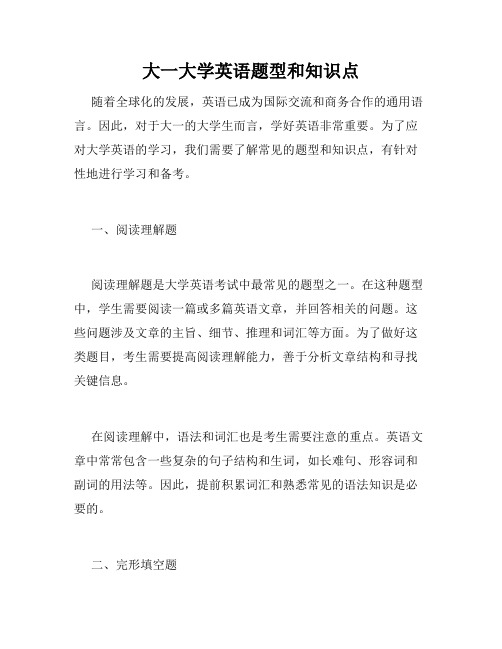
大一大学英语题型和知识点随着全球化的发展,英语已成为国际交流和商务合作的通用语言。
因此,对于大一的大学生而言,学好英语非常重要。
为了应对大学英语的学习,我们需要了解常见的题型和知识点,有针对性地进行学习和备考。
一、阅读理解题阅读理解题是大学英语考试中最常见的题型之一。
在这种题型中,学生需要阅读一篇或多篇英语文章,并回答相关的问题。
这些问题涉及文章的主旨、细节、推理和词汇等方面。
为了做好这类题目,考生需要提高阅读理解能力,善于分析文章结构和寻找关键信息。
在阅读理解中,语法和词汇也是考生需要注意的重点。
英语文章中常常包含一些复杂的句子结构和生词,如长难句、形容词和副词的用法等。
因此,提前积累词汇和熟悉常见的语法知识是必要的。
二、完形填空题完形填空是另一种常见的大学英语题型。
在这种题目中,考生需要根据短文内容,在空格中选择最佳的选项,使整篇短文通顺、连贯。
此题型要求考生具备一定的阅读理解能力和对语法的掌握。
为了做好完形填空题,考生需要注意上下文的逻辑关系,理解文章的整体意思。
此外,还要注意一些常见的语法知识点,如时态、语态和词性等。
通过练习,我们可以提高自己的完形填空答题能力。
三、听力理解题听力理解题是大学英语考试中的重要题型,通过听取英语录音,考生需要回答相关的问题。
此题型既考察听力能力,又对词汇、语法和推理能力有一定要求。
为了提高听力理解能力,考生可以多听英语材料,如听美剧、听英语新闻等。
同时,平时也要注重词汇的积累和对不同口音和语速的适应。
四、写作题写作题是大学英语考试中最具挑战性的题型之一。
在作文中,考生需要根据所给的题目或图表等进行写作,展示自己的思维逻辑和表达能力。
因此,良好的写作技巧和丰富的词汇储备是非常重要的。
在写作中,要注意句子的连贯性和段落的结构。
同时,要注重语法和拼写的准确性。
通过多写多练,我们可以提高自己的写作水平。
总结大一的大学英语学习,面临着各种题型和知识点的挑战。
除了以上提到的题型和知识点,还有词汇量、语法、口语等。
大学英语(四)复习大纲及参考答案
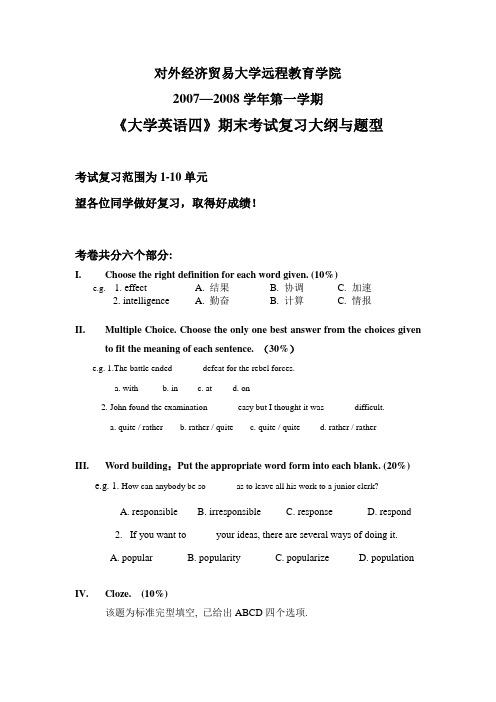
对外经济贸易大学远程教育学院2007—2008学年第一学期《大学英语四》期末考试复习大纲与题型考试复习范围为1-10单元望各位同学做好复习,取得好成绩!考卷共分六个部分:I.Choose the right definition for each word given. (10%)e.g. 1. effect A. 结果 B. 协调 C. 加速2. intelligence A. 勤奋 B. 计算 C. 情报II.Multiple Choice. Choose the only one best answer from the choices given to fit the meaning of each sentence. (30%)e.g. 1.The battle ended ______ defeat for the rebel forces.a. withb. inc. atd. on2. John found the examination ______ easy but I thought it was ______ difficult.a. quite / ratherb. rather / quitec. quite / quited. rather / ratherIII.W ord building:Put the appropriate word form into each blank. (20%)e.g. 1. How can anybody be so ______ as to leave all his work to a junior clerk?A. responsibleB. irresponsibleC. responseD. respond2.If you want to _____ your ideas, there are several ways of doing it.A. popularB. popularityC. popularizeD. populationIV.Cloze. (10%)该题为标准完型填空, 已给出ABCD四个选项.V.Reading comprehension. Read the passage below, and choose the only one right answer from the four choices given. (10%)阅读理解VI. Translation. (10%) Select the best translation from the two given choices marked A and B.e.g. 1. 他继承父业, 也从事戏剧工作。
英语考试有哪些题型和考察内容?
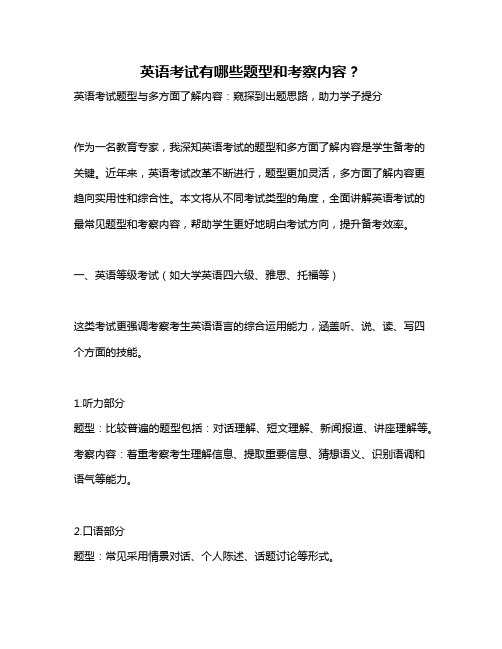
英语考试有哪些题型和考察内容?英语考试题型与多方面了解内容:窥探到出题思路,助力学子提分作为一名教育专家,我深知英语考试的题型和多方面了解内容是学生备考的关键。
近年来,英语考试改革不断进行,题型更加灵活,多方面了解内容更趋向实用性和综合性。
本文将从不同考试类型的角度,全面讲解英语考试的最常见题型和考察内容,帮助学生更好地明白考试方向,提升备考效率。
一、英语等级考试(如大学英语四六级、雅思、托福等)这类考试更强调考察考生英语语言的综合运用能力,涵盖听、说、读、写四个方面的技能。
1.听力部分题型:比较普遍的题型包括:对话理解、短文理解、新闻报道、讲座理解等。
考察内容:着重考察考生理解信息、提取重要信息、猜想语义、识别语调和语气等能力。
2.口语部分题型:常见采用情景对话、个人陈述、话题讨论等形式。
考察内容:考察考生流利度、词汇量、语法准确性、逻辑清晰度、发音清晰度、语调运用等能力。
3.阅读理解部分题型:常见的题型包括主旨题、细节题、推理题、词汇题、态度题等。
部分考试还会加入篇章理解、英译汉等题型。
考察内容:主要考察考生文本理解、逻辑推理、词汇积累、语法分析等能力。
4.写作部分题型:常见题型包括议论文、说明文、应用文等。
考察内容:考察考生写作思路、论证逻辑、语言表达、语法结构、词汇应用、文章结构等能力。
二、中小学英语考试中小学英语考试的题型和考察内容与学生阶段相对应,比较多偏重于对基础知识和基本技能的考核。
1.词汇与语法题型:最常见题型包括单词填空、词语搭配、句型转换、语法选择等。
考察内容:主要考察学生对单词、词组、固定搭配、语法规则、句型结构等基本知识的掌握程度。
2.阅读理解题型:比较普遍的题型包括细节题、主旨题、推理题、词义推断题等。
考察内容:主要考察学生对文本信息的理解、关键信息的提取、逻辑推理能力等。
3.写作题型:常见的题型包括短文写作、书面表达等。
考察内容:主要考察学生语言表达、语法结构、词汇应用、文章组织等方面的基本写作能力。
期末试题总结大学英语
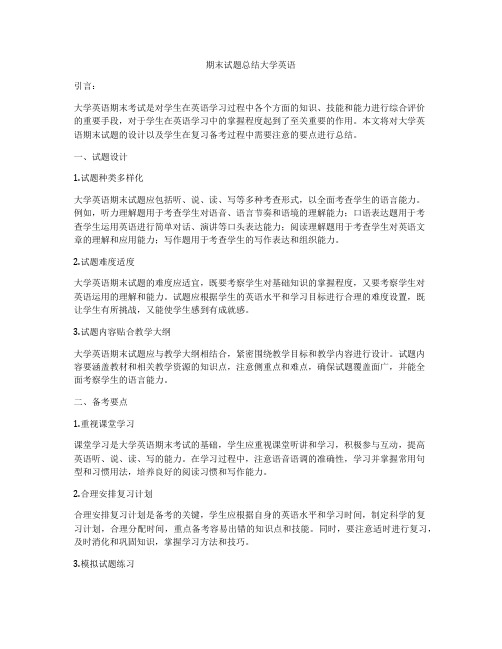
期末试题总结大学英语引言:大学英语期末考试是对学生在英语学习过程中各个方面的知识、技能和能力进行综合评价的重要手段,对于学生在英语学习中的掌握程度起到了至关重要的作用。
本文将对大学英语期末试题的设计以及学生在复习备考过程中需要注意的要点进行总结。
一、试题设计1.试题种类多样化大学英语期末试题应包括听、说、读、写等多种考查形式,以全面考查学生的语言能力。
例如,听力理解题用于考查学生对语音、语言节奏和语境的理解能力;口语表达题用于考查学生运用英语进行简单对话、演讲等口头表达能力;阅读理解题用于考查学生对英语文章的理解和应用能力;写作题用于考查学生的写作表达和组织能力。
2.试题难度适度大学英语期末试题的难度应适宜,既要考察学生对基础知识的掌握程度,又要考察学生对英语运用的理解和能力。
试题应根据学生的英语水平和学习目标进行合理的难度设置,既让学生有所挑战,又能使学生感到有成就感。
3.试题内容贴合教学大纲大学英语期末试题应与教学大纲相结合,紧密围绕教学目标和教学内容进行设计。
试题内容要涵盖教材和相关教学资源的知识点,注意侧重点和难点,确保试题覆盖面广,并能全面考察学生的语言能力。
二、备考要点1.重视课堂学习课堂学习是大学英语期末考试的基础,学生应重视课堂听讲和学习,积极参与互动,提高英语听、说、读、写的能力。
在学习过程中,注意语音语调的准确性,学习并掌握常用句型和习惯用法,培养良好的阅读习惯和写作能力。
2.合理安排复习计划合理安排复习计划是备考的关键,学生应根据自身的英语水平和学习时间,制定科学的复习计划,合理分配时间,重点备考容易出错的知识点和技能。
同时,要注意适时进行复习,及时消化和巩固知识,掌握学习方法和技巧。
3.模拟试题练习在备考过程中,学生应多做模拟试题,熟悉试题的题型和出题思路,了解试题的难度和考查要点。
通过多次的模拟练习,可以检验学生的学习效果和掌握程度,及时发现问题并进行弥补,提高备考水平和应试能力。
- 1、下载文档前请自行甄别文档内容的完整性,平台不提供额外的编辑、内容补充、找答案等附加服务。
- 2、"仅部分预览"的文档,不可在线预览部分如存在完整性等问题,可反馈申请退款(可完整预览的文档不适用该条件!)。
- 3、如文档侵犯您的权益,请联系客服反馈,我们会尽快为您处理(人工客服工作时间:9:00-18:30)。
2012级普本专业《大学英语》第三学期期末
考试题型与范围
本学期期末考试的主观题(写作+翻译)在第十八周后半周随堂进行笔考;
客观题(包括篇章听写)在第十九周网络课室进行机考。
一.写作15%:来自课外,看图作文或表格作文,字数120-180之间;
二.词汇与结构15%:30题,主要出自读写教程2、4、5、9课后词汇练习III,部分与Text A的重点词汇有关,期中词汇测试题可作为复习参考;三.听力25%:短对话(8题)+长对话1篇、篇章听力1篇(共7题)+篇章词汇听写10分(出自《听力模拟训练》和《视听说教程》的2、4、5、7、9单元);
四.篇章选词5%:出自读写教程2、4、5、9课文后的篇章选词练习V;五.段落信息匹配题10%:出自宝典的补充练习材料;
六.仔细阅读20%:一篇出自《阅读模拟下》2、4、5、7、9单元;一篇课外七.汉译英(10%)
段落翻译读写教程2、4、5、9单元Text A课文段落节选。
